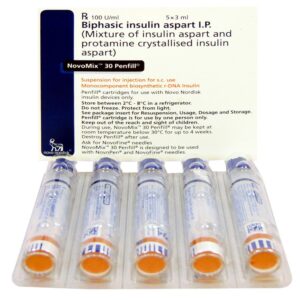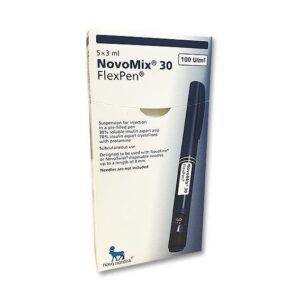PHENOL + DNA Origin Insulin Aspart
Phenol: Phenol, also known as carbolic acid, is a phenolic compound that is commonly used as an antiseptic and disinfectant. It has a wide range of applications, including as a topical analgesic, a cauterizing agent, and in chemical peels.
The mechanism of action of phenol involves the denaturation of proteins, leading to cell death. It works by disrupting the cell membranes and coagulating proteins, resulting in tissue necrosis. This makes phenol an effective agent for debriding wounds, removing calluses, and treating certain skin conditions.
Phenol is typically applied topically in the form of a liquid or gel. The concentration of phenol used can vary depending on the intended use. For example, lower concentrations (around 0.5% to 2%) are used for topical analgesia, while higher concentrations (up to 10%) may be used for chemical peels or cauterization.
Phenol is generally considered safe when used appropriately, but it can have side effects. When applied topically, it can cause local irritation, burning, or stinging sensation. Prolonged or excessive exposure to phenol may result in systemic toxicity, which can manifest as symptoms such as dizziness, weakness, rapid breathing, and even cardiac arrhythmias.
It is important to note that phenol should only be used under medical supervision and in accordance with the specific instructions provided by a healthcare professional.
Dna Origin Insulin Aspart: Drug name: DNA Origin Insulin Aspart
Use: DNA Origin Insulin Aspart is a medication used to treat diabetes mellitus, a condition characterized by high blood sugar levels. It is specifically indicated for controlling blood sugar levels in people with type 1 diabetes and type 2 diabetes.
Mechanism of Action: DNA Origin Insulin Aspart works by mimicking the effects of insulin, a hormone naturally produced by the pancreas. Insulin is responsible for regulating glucose metabolism in the body. Insulin aspart is a rapid-acting insulin analog that facilitates the uptake of glucose from the bloodstream into cells, where it is used for energy production or stored as glycogen.
Dose: The dosage of DNA Origin Insulin Aspart may vary depending on individual needs, as determined by a healthcare professional. Generally, the dose should be individualized based on factors such as age, weight, blood glucose levels, and concomitant medications. It is typically administered subcutaneously (under the skin) using a syringe, insulin pen, or insulin pump.
Side Effects: Like any medication, DNA Origin Insulin Aspart may cause side effects. Common side effects include:
1. Hypoglycemia (low blood sugar): This is the most common side effect, especially if the dose is too high or when combined with other antidiabetic medications.
2. Injection site reactions: These may include redness, swelling, itching, or lumps at the injection site.
3. Hypersensitivity reactions: Some individuals may experience allergic reactions, such as rash, itching, difficulty breathing, or swelling of the face, lips, tongue, or throat.
4. Weight gain: Insulin therapy can potentially lead to weight gain due to improved glucose utilization and increased appetite.
It is important to note that this is not an exhaustive list of side effects, and individuals may experience other side effects. Patients should consult their healthcare providers for a comprehensive list of potential side effects before starting treatment with DNA Origin Insulin Aspart.
Cold chain products like insulins, vaccines etc. are available for pickup only.


